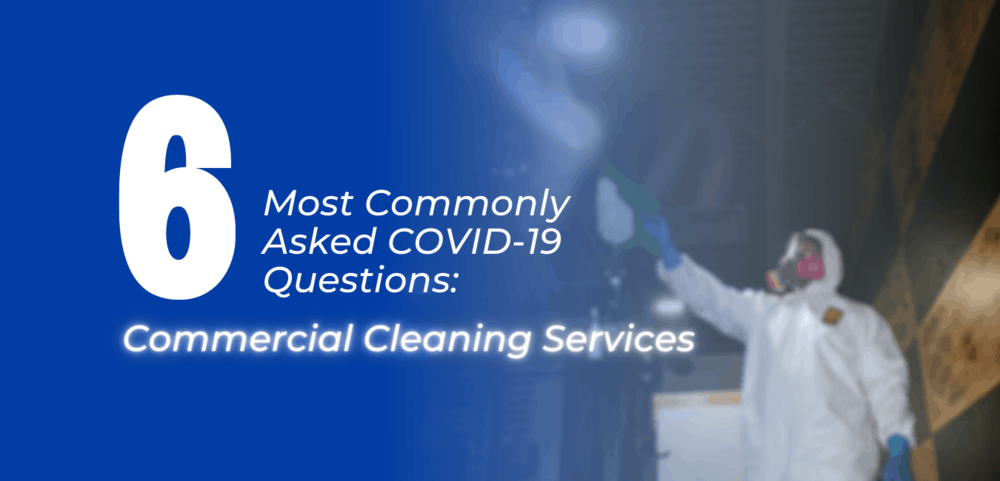Right now, it is almost impossible to avoid hearing and talking about COVID-19, and everybody has their own opinion based on whatever information they heard that day. Because there is so much information out there, much of it is conflicting and can be extraordinarily difficult to figure out what is true. Deciding what you should do to keep your facility and the people in your facility safe can feel a bit like drinking from a fire hose. People in the commercial cleaning industry have tried to stay ahead of the issue, even with facts and protocols changing every day. What makes it even worse is the fact that some participants are making false and unrealistic claims, because they are simply trying to profit off of the pandemic and people’s panic.
Below is a list of questions that we, as a commercial disinfectant service, have been asked repeatedly as the pandemic has progressed. Of course, there are many more questions that people could ask and all of the answers may change as more information is discovered and released.
1. QUESTION: How do I know if the disinfectant used by the commercial cleaning company I hired is effective at fighting COVID-19?
ANSWER: The EPA or Εnvironmental Protective Agency has a list, List N, that is a complete list of EPA registered disinfectants that are proven to be effective in combating Human Coronavirus, so you should look to find the disinfectant chemicals that the cleaning company is using on the last. The EPA has not yet established any protocols for surface disinfectants, but the science community seems to hold the general belief that when the proper protocols are established, the same surface disinfectants used to fight other Coronaviruses will be effective to fight COVID-19.
Below is the link to List N:
https://www.epa.gov/pesticide-registration/list-n-disinfectants-coronavirus-covid-19
2. QUESTION: Are things like electrostatic spraying and fogging effective coronavirus cleaning methods my facility?
ANSWERS: Electrostatic sprayers disperse charged droplets of disinfectants that are attracted to various surfaces, so the spray wraps around things like tables and desks to disinfect everything, including backsides and small crevices. Fogging, also called misting, is when small droplets of a disinfectant are sprayed over surfaces, but this often results in very uneven coverage, so if you are choosing between the two, go with electrostatic sprayers as they are much more effective. No matter which one you are going to use, it is vital that you clean all the surfaces first because any dust and debris will prevent the disinfectant from actually reaching the surface and destroying any remnants of coronavirus.
3. QUESTION: What would you recommend for regular COVID-19 disinfecting and keeping my facility as safe as possible during the pandemic?
ANSWERS: Unfortunately, there is no cleaning or disinfecting process/method that will guarantee that all surfaces in your facility will be completely void of COVID contamination. However, that does not mean there are not things that you can do to make your facility safer and lessen the chances of COVID spread throughout your facility. First of all, you should make sure to complete daily, routine cleaning where you clean all surfaces in your facility with soap and water or another disinfectant. Second, you should wipe surfaces with a disinfectant from List N, paying special attention to any high-touch surfaces such as tables, doorknobs, light switches, and handles. If you have a lot of people in your facility, you need to complete these routines several times throughout the day. Remember, these things are in addition to a regular deep clean.
4. QUESTION: What is dwell time, how long does it need to be, and is it necessary?
ANSWER: Dwell time, also called contact time by some companies, is the amount of time that a disinfectant needs to sit on a surface before you wipe it off or touch it for proper disinfecting. In order to find a specific disinfectant’s dwell time, you need to look at the product label. The contact time for most disinfectants is between three and five minutes, but there are some products that have close to ten minutes. Most commercial cleaning services will also be able to provide you specific information when it comes to dwell time.
5. QUESTION: Are there any products or processes that will kill off COVID-19 particles for an extended period of time?
ANSWERS: No, there are companies selling disinfectants with the claim that they will continue to prevent the spread of COVID-19 on surfaces for up to 90 days with one application, but there is no actual evidence backing up these claims. They are more likely a money-making gimmick than anything that will actually protect your facility or your people. Regular cleaning is the best option. Furthermore, if the commercial disinfectant service you hire tries to sell you on these products, it may be best to find a different company as they should be aware that these products do not work well.
6. QUESTION: How long after disinfection does a surface remain free from contamination?
ANSWER: This depends on a variety of different factors such as how many people are in the building and what surfaces they touch. If someone with the virus touches the surface right after it was disinfected, it may already be re-contaminated. This is made more true by the fact that, as previously stated, there are no disinfectants that kill off coronavirus for an extended period of time. However, unless a person sneezes or coughs on the surface, it probably will not be contaminated because COVID-19 is mainly spread through respiratory droplets and from person to person.
In conclusion, there is a lot of mixed information about COVID-19, but everyone generally agrees that regular general cleaning and disinfecting of high touch surfaces is the best thing you can do to protect your facility and the people in your facility from COVID-19. For regular updates on processes and policies, you can look to the CDC (centers for disease control) and other public health organizations

